|
|
|
Sort Order |
|
|
|
Items / Page
|
|
|
|
|
|
|
| Srl | Item |
| 1 |
ID:
141100
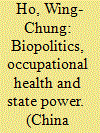

|
|
|
|
|
| Summary/Abstract |
This article endeavours to address the experience of Chinese workers with occupational disease as an instantiation of Agamben's notion of homo sacer – the ultimate biopolitical subject whose life is located outside the “normal” political, economic and cultural practices and, hence, is rendered largely silent and unintelligible in the public realm. It argues that the victimization of the occupationally sick worker has become almost a blind spot at the centre of governmentality insofar as the specific set of social regulations and power relations has created a “double ambivalence” among the victims who are constantly and disturbingly caught in between the public and private, the productive and unproductive, and the culturally normative and the culturally deviant. Such experiences of marginality contribute to the understanding of the biopolitical nature of contemporary Chinese state power, which adopts extensive “stability maintenance” (weiwen) measures to reduce resisters to a state of “bare life” susceptible to the rule of exception.
|
|
|
|
|
|
|
|
|
|
|
|
|
|
|
|
| 2 |
ID:
186945
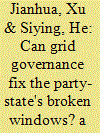

|
|
|
|
|
| Summary/Abstract |
Grid governance has been developed by the Chinese party-state to collect intelligence at the grassroots level for the early pre-emption of what it defines as social instability. Using data collected from four months’ participant observation and extensive interviews with personnel who work in the grid governance system in what we call W Street, a location in a second-tier city in southern China, this paper examines how China's grid governance is used for stability maintenance and how in practice the system has become alienated from its original purpose of social control. We find that grid governance is achieved mainly through three mechanisms: intelligence gathering, case coordination and real-time reporting for stability maintenance. We further reveal that while grid governance provides an important infrastructural power for intelligence gathering, the realization of this power could be hindered by contradictory logics among different levels of government. This research not only provides empirical data on how China's grid governance works in practice but also calls for a rethinking of the capacity of China's stability maintenance regime.
|
|
|
|
|
|
|
|
|
|
|
|
|
|
|
|
| 3 |
ID:
144749
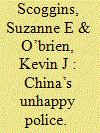

|
|
|
|
|
| Summary/Abstract |
Facing heavy caseloads, administrative drudgery, and low pay, China’s street-level police are frustrated. Front-line officers from six cities report that discontent encourages shirking, corruption, and waste. Grievances and feelings of powerlessness have not been reduced by recent reforms, and give us cause to rethink the image of police as effective arms of a highly securitized state.
|
|
|
|
|
|
|
|
|
|
|
|
|
|
|
|
| 4 |
ID:
167385
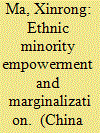

|
|
|
|
|
| Summary/Abstract |
While there is an emerging body of literature that examines labour resistance within industrial cities in China, there is, however, little research on ethnic minority labour migrants, in particular their interaction with the local state in migrant-receiving cities. This study fills this research gap by focusing on ethnic Yi labour migrants in the Pearl River Delta area. Based on seven and a half months of fieldwork, this article illustrates the ways in which local governments cope with Yi labour disputes on the one hand, and the strategies that Yi migrants developed – emphasizing their minority status while negotiating their labour rights – on the other. The article finds that a strategy to maintain stability by applying patronage selectively to certain ethnic groups cultivates ethnic elites as middlemen to appease workers’ collective disputes in the short term. However, the state’s failure to fully recognize cultural differences of ethnic minorities and to protect their labour rights results in more resistance and marginalization of ethnic minority labourers in the long term. In this way, the Chinese government’s current policy may jeopardize the wider aim of maintaining social order.
|
|
|
|
|
|
|
|
|
|
|
|
|
|
|
|
| 5 |
ID:
172295
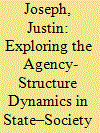

|
|
|
|
|
| Summary/Abstract |
Based on the data from the 13-month field visit spread over two trips (September 2016 to December 2016 and September 2017 to July 2018), this study highlights how securitisation efforts from the central government interact with environmental non-governmental organisation (ENGO) activism and advocacy in China, producing diverse outcomes across temporal and spatial dimensions. The trajectory of state–society relations in the context of environmental governance depends on (a) the ability of party-state to control ‘new media’ activism and manage ENGO advocacy to ‘maintain stability/rule by law’ and (b) ability of the assemblage of media activism and ENGO advocacy, along with other agents, to support the transition from ‘rule by law’ to ‘rule of law’. The overall findings are discussed in the context of the ‘Copenhagen School’ framework in International Relations Theory to examine the process of securitisation in the environmental sector in China. The securitising actor (the one who leads the process of securitisation such as States), referent object (the object under existential threat, i.e. human nature harmony) and functional actors (those who support or oppose the process of securitisation, i.e. ENGOs) are the major players involved.
|
|
|
|
|
|
|
|
|
|
|
|
|
|
|
|
| 6 |
ID:
183001
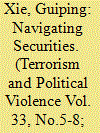

|
|
|
|
|
| Summary/Abstract |
This article draws on critical scholarship on (counter-)terrorism as well as the authors’ long-term fieldwork (conducted in Xinjiang from 2005 to 2017) to explore not only the securitizing agency of the state and counter-securitizing agency of “terrorists” but also the manner in which other societal actors (involving street-level bureaucrats, local Imams, and ethnic inhabitants) interact with these processes in China. This article argues that the practice of security, both in the Chinese province of Xinjiang and across China, has a performative quality to it, which manifests in not merely the official regulations and propagandas, but also the localized responses to their bureaucratic operations in the state project of “stability maintenance.” While the “stability”-focused counter-terrorism activities in China involve supplementing the traditional model of retrospective intervention with a performance-based, preemptive approach that allows for more civic participation, the authors argue that the public performance of “stability” and “counter-terrorism” has become a means of professional advancement and/or survival for local cadres. In the unstable geopolitical environment of Xinjiang, where anxious contests have taken place between state and various non-state powers for control over territory, the government has been compelled to constantly seek out potential agents (referring in the present context to local cadres, Imams, and mosques) in order to forge local partnerships as part of the process of implementing counter-terrorism policies. The article examines how local cadres and ethnic inhabitants in Xinjiang, being motivated by their own survival and interests, react to and capitalize on the processes of implementing counter-terrorism policies in local societies, which ultimately challenges the ability of the state to rule and thus leads to unpredicted and unintended counter-terrorism policy outcomes.
|
|
|
|
|
|
|
|
|
|
|
|
|
|
|
|
| 7 |
ID:
139556
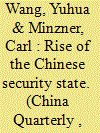

|
|
|
|
|
| Summary/Abstract |
Over the past two decades, the Chinese domestic security apparatus has expanded dramatically. “Stability maintenance” operations have become a top priority for local Chinese authorities. We argue that this trend goes back to the early 1990s, when central Party authorities adopted new governance models that differed dramatically from those of the 1980s. They increased the bureaucratic rank of public security chiefs within the Party apparatus, expanded the reach of the Party political-legal apparatus into a broader range of governance issues, and altered cadre evaluation standards to increase the sensitivity of local authorities to social unrest. We show that the origin of these changes lies in a policy response to the developments of 1989–1991, namely the Tiananmen democracy movement and the collapse of communist political systems in Eastern Europe. Over the past twenty years, these practices have developed into an extensive stability maintenance apparatus, whereby local governance is increasingly oriented around the need to respond to social unrest, whether through concession or repression. Chinese authorities now appear to be rethinking these developments, but the direction of reform remains unclear.
|
|
|
|
|
|
|
|
|
|
|
|
|
|
|
|
| 8 |
ID:
193132
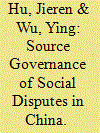

|
|
|
|
|
| Summary/Abstract |
This article examines the features and limits of a new dispute resolution mechanism implemented by Chinese courts called, “Source Governance of Social Disputes” (SGSD). Differing from existing extralegal means of dispute resolution, SGSD aims to bring courts back to the center of dispute resolution by pre-emptively intervening in dispute-prone processes via technology-based mechanisms. However, this has generated two pitfalls. Although preemptive repression can be adopted by deploying digital technologies to impose mediation on people and persuade them to make compromises, such technological deployment by and large fails to resolve the root causes of social disputes. Additionally, SGSD introduces new risks of technological abuse which may coerce litigants to accept mediation instead of adjudication, causing an erosion of public confidence in the Chinese legal system and a weakening of regime legitimacy.
|
|
|
|
|
|
|
|
|
|
|
|
|
|
|
|
| 9 |
ID:
146510
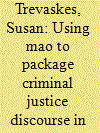

|
|
|
|
|
| Summary/Abstract |
“Strike hard” anti-crime campaigns, “harmonious justice” and “stability maintenance” are the three key politically inspired agendas of crime control and punishment in 21st-century China. This paper is a study of how discourse has helped to package these agendas and to mobilize politico-legal functionaries into action. It examines discourse in the first weeks of the 2014 “people's war on terror” and the agendas of “harmonious justice” and “stability maintenance” in the Hu Jintao era. It finds that each has been rationalized and shaped by an understanding of the utility of punishment based on Mao's utilitarian dialectics. The political virtuosity of Mao's dialectics is that it can be adapted to suit any political situation. In understanding how Mao connects with criminal justice in China today, this paper identifies what is the “political” in “politico-legal” discourse in the fight against crime in the 21st century.
|
|
|
|
|
|
|
|
|
|
|
|
|
|
|
|
|
|
|
|
|